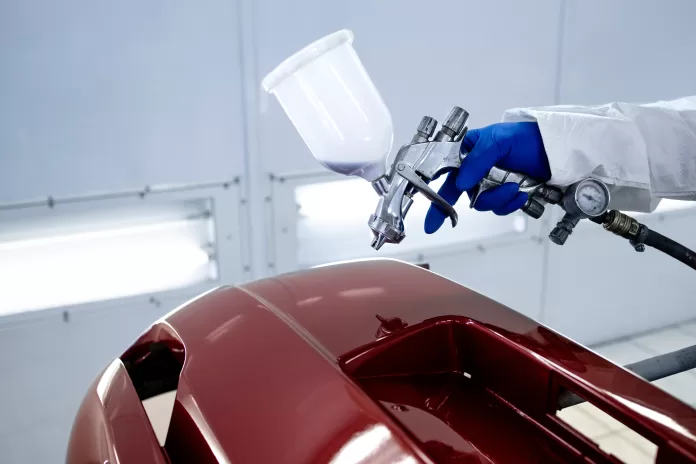
Ghana, the second most populous nation in West Africa after Nigeria, has experienced significant growth in its automotive sector, largely fueled by a strategic investment policy. This policy has encouraged the establishment of new vehicle assembly plants, which is poised to increase demand for advanced paints and coatings solutions.
Over the past five years, the number of international original equipment manufacturers (OEMs), local assemblers, and distributors in Ghana has risen steadily. This surge is primarily attributed to the 2019 Automotive Development Policy (ADP), which offers attractive incentives to attract private investors. These include corporate tax holidays of five to 10 years, a 65% tariff reduction for local assembly compared to imports, zero import duties on plant machinery and equipment, andn value-based refunds. As a result, Ghana’s automotive market, now valued at over US$4 billion, is expanding rapidly, creating new opportunities for paint and coatings companies. These firms can supply products that enhance vehicle aesthetics, such as vibrant colors, while also providing corrosion protection for metal components.
The ADP aims to transform Ghana into a fully integrated automotive hub by drawing major OEMs to establish assembly plants and boost production volumes. Specifically, it targets investments in assembling new passenger cars, SUVs, and light commercial vehicles like pickups, minibuses, and cargo vans. This expansion is expected to drive demand for a wide range of OEM and refinish coatings, including those with environmentally friendly technologies that minimize ecological impact.
Several global OEMs have increased their presence in Ghana in recent years, including Volkswagen, Toyota, Suzuki, Nissan, Peugeot, KIA, Hyundai, Changan, Foton, Kantanka, ZX Auto, Honda, Ashok Leyland, and Great Wall Motors. Some of these companies sell vehicles directly to consumers, while others have partnered with local distributors. This growth aligns with rising consumer awareness of environmental sustainability, leading to increased interest in electric vehicles and eco-friendly coatings for interiors, exteriors, and metal surfaces. Additionally, government restrictions on importing vehicles older than 10 years are further stimulating local assembly investments.
Notable examples include Toyota Motor Corporation, which has opened multiple assembly plants in Ghana, and Nissan Motor Co. Ltd., which recently launched a cutting-edge facility capable of producing 31,000 vehicles annually. Nissan describes this plant as the most advanced in West Africa. In tandem with this investment, Nissan has developed an innovative car paint that uses metamaterials to reflect sunlight and reduce heat absorption. Currently in the testing phase, this paint has shown promising results: vehicles coated with it exhibited a 12°C (21.6°F) cooler exterior surface and a 5°C (9°F) cooler interior compared to those with traditional paint. According to Nissan, the technology works through two types of microscopic particles—one that reflects near-infrared rays to prevent heat buildup and another that generates electromagnetic waves to redirect solar energy away from the vehicle. The company emphasizes that the paint must be thin enough for spray application while meeting high-quality standards. If successful, Nissan plans to offer it as a special option for cars and light commercial vehicles, potentially through its Ghanaian affiliates.
Meanwhile, the electric vehicle sector is gaining momentum despite challenges like high electricity costs. For instance, Chinese EV manufacturer ROX 01 has partnered with Ronor Motors Ghana Ltd., designating it as the exclusive distributor in Ghana and West Africa. Locally, Kantanka Automobile, a Ghanaian manufacturer that assembles vehicles from knock-down kits, has announced plans to produce an all-electric city car. Both government and private entities are investing in charging infrastructure to promote EV adoption in this nation of 35 million people.
Ghana’s Paint and Coatings Market
This expansion is creating ripple effects in Ghana’s paints and coatings market. Companies supplying e-coats, primers, basecoats, and clearcoats—such as PPG Industries, AkzoNobel, Plascon, BBC Industrials, Neuce Ghana Paints, Inesfly Africa Ltd., CHIC, Suvinil Paints Ghana, Cresta Paint Industries Ltd., Bamson Co Ltd., Express Inter Africa Ltd., and Macro Polymers Ltd.—are well-positioned to benefit. These firms distribute products through direct channels or dealers, increasingly leveraging online marketing to meet demand for durable and eco-friendly options. AkzoNobel, for example, serves the Ghanaian market via Dulux Ghana, which also covers Togo and Burkina Faso.
Environmental Sustainability
Looking ahead, demand for automotive paints and coatings may shift due to regulatory pressures. Nearly 90% of the approximately 100,000 vehicles imported annually are used, but efforts to limit these imports, driven by the higher cost of new vehicles, could boost the need for refinish coatings over OEM ones. Ultimately, Ghana’s ADP remains the primary catalyst for this growth, particularly for paints used in passenger and hybrid vehicles. As the country works toward its goal of reducing emissions by 64 MtCO2e by 2030, the emphasis on sustainable coatings will likely play a key role in shaping the industry’s future.



